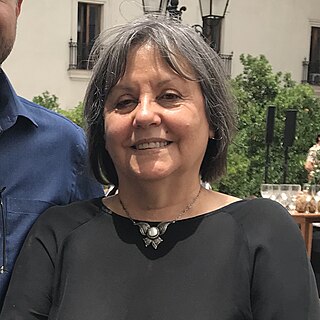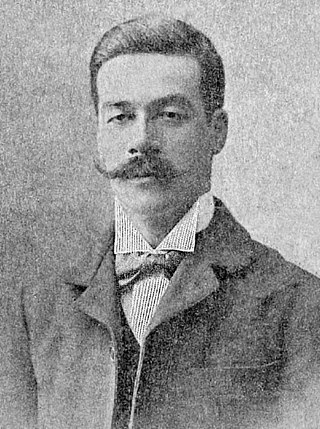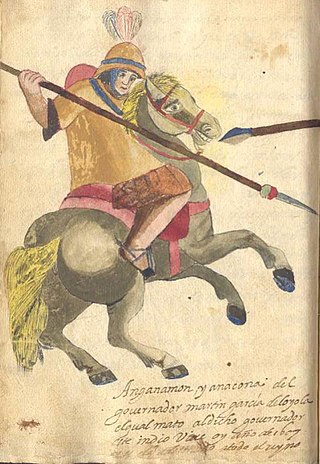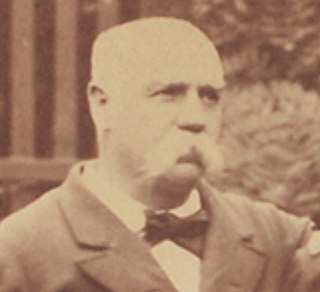
Club de Deportes Cobreloa S.A.D.P., commonly referred to as Cobreloa, is a Chilean football professional club based in Calama, Región de Antofagasta, Chile. They compete in the Primera B. The club's home ground is the Estadio Zorros del Desierto.

Diamela Eltit is a Chilean writer and university professor. She is a recipient of the National Prize for Literature.
This is a timeline of Chilean history, comprising important legal and territorial changes and political events in Chile and its predecessor states. To read about the background to these events, see History of Chile. See also the list of governors and presidents of Chile.

Spanish is the de facto official and administrative language of Chile. Spoken by 99.3% of the population in the form of Chilean Spanish, as well as Andean Spanish and Chilean Catalan, Spanish in Chile also receives the title of "castellano." Although an officially recognized Hispanic language does not exist at the governmental level, the Constitution itself- as well as all official documents- is written in this language.

Joaquín Edwards Bello was a Chilean writer and journalist of British descent.

Enrique Eduardo Lafourcade Valdenegro was a Chilean writer, critic and journalist from Santiago.

Luis Emilio Recabarren Serrano was a Chilean political figure. He was elected several times as deputy, and was the driving force behind the worker's movement in Chile.
Luis Roberto Parra Sandoval, also known as El Tío Roberto, was a Chilean singer-songwriter, guitarist and folklorist, member of the Parra family, many of whose members are famous artists. He died in Santiago at age 73.
There are several football rivalries amongst clubs in Chile.

The Destruction of the Seven Cities is a term used in Chilean historiography to refer to the destruction or abandonment of seven major Spanish outposts in southern Chile around 1600, caused by the Mapuche and Huilliche uprising of 1598. The Destruction of the Seven Cities, in traditional historiography, marks the end of the Conquest period and the beginning of the proper colonial period.

Spanish Chileans refer more often to Chileans of post-independence Spanish immigrant descent, as they have retained a Spanish cultural identity. People of pre-independence Spanish descent are usually not considered Spanish Chileans even though they form a large majority of the Chilean population and have Spanish surnames and ancestry. This is because they rejected Spanish identity for the emergent Chilean one on the eve of national independence.

In 2011, Chile was home to 42% of the world's astronomical infrastructure, consisting principally of telescopes. In 2015, it was estimated that Chile would contain more than 50% of the global astronomical infrastructure by 2030. In the Atacama desert region of northern Chile, the skies are exceptionally clear and dry for more than 300 days of the year. These conditions have attracted the world's scientific community to develop highly ambitious astronomical projects in the Atacama desert.

Chilean literature refers to all written or literary work produced in Chile or by Chilean writers. The literature of Chile is usually written in Spanish. Chile has a rich literary tradition and has been home to two Nobel prize winners, the poets Gabriela Mistral and Pablo Neruda. It has also seen three winners of the Miguel de Cervantes Prize, considered one of the most important Spanish language literature prizes: the novelist, journalist and diplomat Jorge Edwards (1998), and the poets Gonzalo Rojas (2003) and Nicanor Parra (2011).
Sady Zañartu was a Chilean writer who created foundational works in the genres of Criollismo, historical anecdote, and patriotic valorization of the nation. He won the Chilean National Prize for Literature in 1974.
Drunk Ship is the translation from Spanish of the 50 pages collection of poems Barco Ebrio by Salvador Reyes Figueroa, originally published in 1923, Santiago, Chile, by editorial Nascimiento. It is the very first work of this writer.

Chilean cinema refers to all films produced in Chile or made by Chileans. It had its origins at the start of the 20th century with the first Chilean film screening in 1902 and the first Chilean feature film appearing in 1910. The oldest surviving feature is El Húsar de la Muerte (1925), and the last silent film was Patrullas de Avanzada (1931). The Chilean film industry struggled in the late 1940s and in the 1950s, despite some box-office successes such as El Diamante de Maharajá. The 1960s saw the development of the "New Chilean Cinema", with films like Three Sad Tigers (1968), Jackal of Nahueltoro (1969) and Valparaíso mi amor (1969). After the 1973 military coup, film production was low, with many filmmakers working in exile. It increased after the end of the Pinochet regime in 1989, with occasional critical and/or popular successes such as Johnny cien pesos (1993), Historias de Fútbol (1997) and Gringuito (1998).

Benjamín Vicuña Mackenna was a Chilean writer, journalist, historian and politician. Vicuña Mackenna was of Irish and Basque descent.

Louis-Amadeo Brihier Lacroix, alias Émile Dubois was a French-born criminal and serial killer known as a folk hero in Chile.

Nicomedes Guzmán, was a Chilean writer, editor, poet, and novelist.

The anarchist movement in Chile emerged from European immigrants, followers of Mikhail Bakunin affiliated with the International Workingmen's Association, who contacted Manuel Chinchilla, a Spaniard living in Iquique. Their influence could be perceived at first within the labour unions of typographers, painters, builders and sailors. During the first decades of the 20th century, anarchism had a significant influence on the labour movement and intellectual circles of Chile. Some of the most prominent Chilean anarchists were: the poet Carlos Pezoa Véliz, the professor Dr Juan Gandulfo, the syndicalist workers Luis Olea, Magno Espinoza, Alejandro Escobar y Carballo, Ángela Muñoz Arancibia, Juan Chamorro, Armando Triviño and Ernesto Miranda, the teacher Flora Sanhueza, and the writers José Domingo Gómez Rojas, Fernando Santiván, José Santos González Vera and Manuel Rojas. At the moment, anarchist groups are experiencing a comeback in Chile through various student collectives, affinity groups, community and cultural centres, and squatting.














